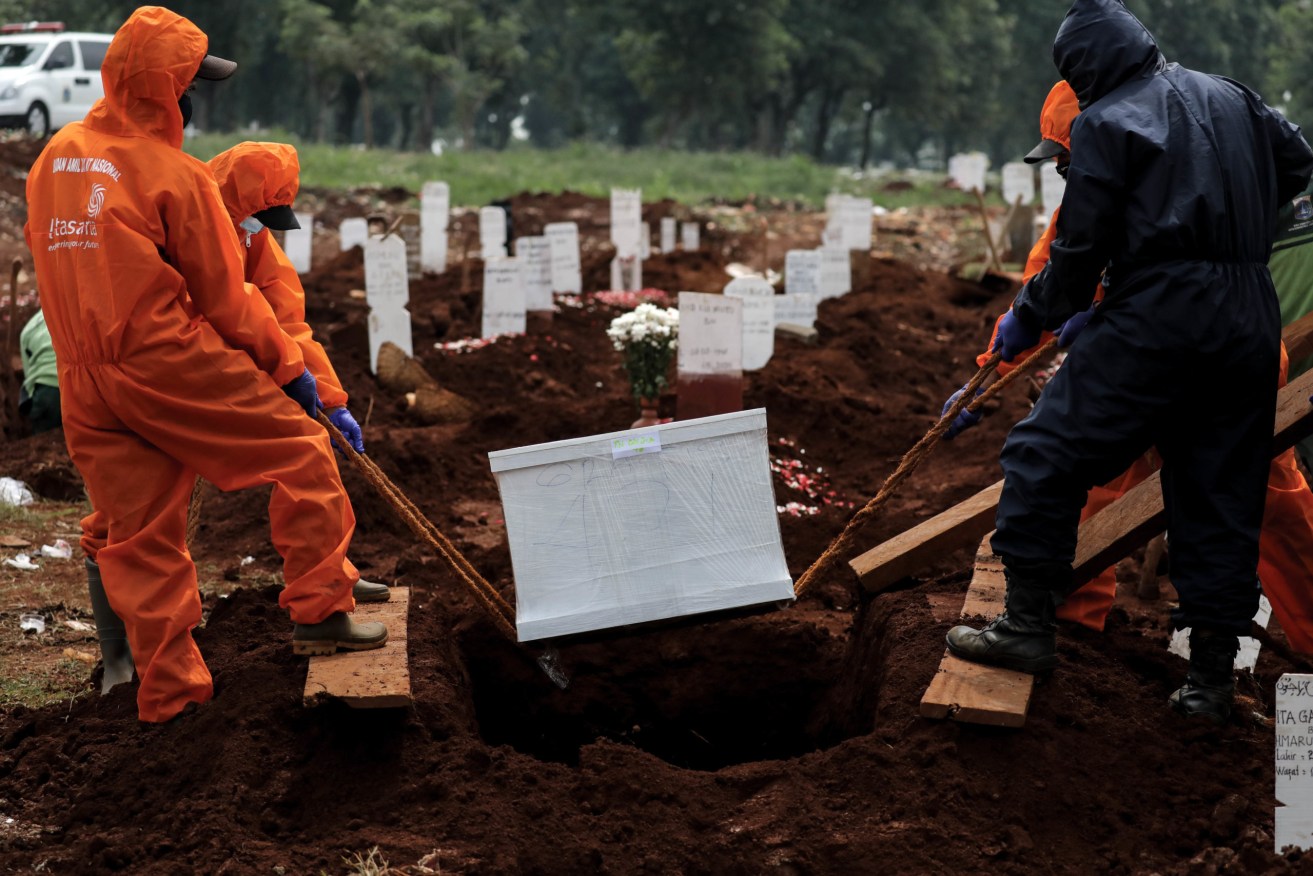106,000 new virus cases in 24 hours
The World Health Organisation says that 106,000 new cases of infections of the coronavirus have been recorded in the past 24 hours, the most in a single day since the outbreak began.

Another burial at a designated COVID-19 graveyard in Jakarta, Indonesia. Photo: Risa Krisadhi/Pacific Press/Sipa USA
“We still have a long way to go in this pandemic,” WHO director-general Tedros Adhanom Ghebreyesus told a news conference.
“We are very concerned about rising cases in low and middle income countries.”
Mike Ryan, head of WHO’s emergencies programme, said: “We will soon reach the tragic milestone of 5 million cases”.
Many countries around the world are loosening their coronavirus restrictions but people are discovering that what a return to normal looks like varies widely.
In Spain, it’s a new government order to wear masks outside even as some businesses reopen.
READ MORE: Coronavirus – what we know today
Egypt’s virus tax
Egypt will deduct 1.0 per cent from people’s salaries for 12 months beginning on July 1 to offset the economic repercussions of the coronavirus, according to a draft law approved by the cabinet.
The tax will be imposed across all sectors of the economy in both the public and private sectors for net monthly salaries exceeding 2000 Egyptian pounds ($A193), the cabinet said in a statement.
A tax of 0.5 per cent will be deducted from state pensions.
The measure comes as Egypt tries to deal with the economic impact of the pandemic, which has brought tourism to a standstill, triggered major capital flight and threatened remittances from Egyptians working overseas.
Revenues from the salary tax will be used to support organisations and workers hit by the fallout from the virus, as well as for direct support to some citizens and funding for the medical sector, the cabinet said.
Those affected economically by the outbreak may be exempted from the tax.
Egypt has confirmed more than 13,400 coronavirus cases, including more than 650 deaths, and on Tuesday recorded its biggest rise in daily cases to date.
Italy says one third of restaurants may go bust
In Italy, once-packed restaurants and cafes are facing a huge financial hit as they reopen with strict social distancing rules after a 10-week shutdown.
Experts warn that as many as one-third of the country’s restaurants and bars could go out of business, up to 300,000 jobs in the sector could vanish and losses could reach 30 billion euros ($A49 billion) this year.
The head of the Dutch hospitality industry welcomed a decision to allow bars and restaurants to reopen on June 1 but warned about the impact of mandatory social distancing rules.
“The restrictions are unfortunately unworkable” for many businesses, said Rober Willemsen of Royal Hospitality Netherlands, adding that more government support is needed to ensure the survival of many bars and restaurants.
Education, in many places, is facing radical changes.
Cambridge became the first university in Britain to cancel all face-to-face lectures for the upcoming school year, saying they will be held virtually and streamed online until the summer of 2021.
In the US, the University of Notre Dame in Indiana will bring students back to campus but redesigned its calendar to start the semester early in August and end before Thanksgiving, along with ordering masks, testing and contact tracing.
In South Korea, hundreds of thousands of high school seniors had their temperatures checked and used hand sanitisers as they returned on Wednesday, many for the first time since late last year. Students and teachers were required to wear masks and some schools installed plastic partitions around desks.
France is limiting spaces in its primary schools, giving priority to the children of essential workers and those in need. Some younger students even go on alternating days while high schools remain closed.
While infection rates have been falling in Asia and much of Europe, the pandemic is still spiking in Latin America.
Brazil this week became the world’s third worst-hit country with more than 250,000 confirmed cases despite limited testing.
In Lima, the capital of Peru, coronavirus patients are filling up the city’s intensive care beds.
More than 4.9 million people worldwide have been confirmed infected by the virus, and more than 320,000 deaths have been recorded, according to a tally by Johns Hopkins University.
Russia and Brazil are now behind only the United States in the number of reported infections, and cases are also spiking in India, South Africa and Mexico.
-with AAP
Want to comment?
Send us an email, making it clear which story you’re commenting on and including your full name (required for publication) and phone number (only for verification purposes). Please put “Reader views” in the subject.
We’ll publish the best comments in a regular “Reader Views” post. Your comments can be brief, or we can accept up to 350 words, or thereabouts.




